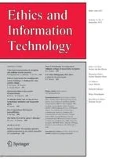Abstract
After describing the Child Pornography Prevention Act (CPPA) of 1996, I argue that the Act ought to be significantly amended. The central objections to CPPA are (1) that it is so broad in its main proscriptions as to violate the First Amendment rights of adults; (2) that it altogether fails to provide minors and their legal guardians with the privacy rights needed to combat the harms associated with certain classes of prurient material on the Internet; and, (3) that the actual rate of technological advance in home computing, and Congress' failure to appreciate how prurient material may be accessed, combined with CPPA to wrongfully expose an increasing number of individuals to possible prosecution and personal ruination. Several other objections are registered along the way, including one aimed at the draconian punishments the law metes out to violators. I close by offering the outlines of an amended version of the law that promises not to violate the rights of adults, that affords children and adults equal and effective protection against the very harmful practices the current law cannot eradicate, and that prescribes punishments that are consistent with the tolerance necessary to support a more democratic vision of the Internet.
Similar content being viewed by others
References
American Civil Liberties Union. Free Speech Advocates Appeal Decision Upholding So-Called ‘Porn Prevention Law’. 〈htto://www.aclu.org/news/n10039b.htm〉, 3 October 1997.
Associated Press. Therapist Convicted of Child Porn. 〈http://wire.ap.org〉, 10 February 1999.
V. Cline. Child Pornography Threatens the Physical and Mental Health and the Well-Being of Children. Child Pornography Prevention Act of 1995. 〈http://thomas.loc.gov/cgi-bin/cpquery/1?cp104:./temp/〉, 5 August 1998.
C.S. Kaplan. Differing Rulings on Child Porn Law Set Up Potential Supreme Court Case. Cyber Law Journal of The New York Times, 〈http://www.nytimes.com/〉, 10 April 1998.
B. Pfaffenberger, editor. Webster's New World Dictionary of Computer Terms, 6th edition. New York, Simon & Schuster, 1997.
San Jose Mercury News. Canada, U.S. in Standoff Over Too-Smart Satellite. 〈http://www.mercurycenter.com/breaking/docs/074537.htm〉, 18 February 1999.
D. Sharp. Court Upholds Child Porn Law. Associated Press, 〈http://wire.ap.org〉, 30 January 1999.
United States Code. Title 18, Section 2246, 〈http://lcweb2.loc.gov/law/GLINv1/GLIN.html〉.
B. Computer-Generated Child Pornography Poses the Same Threat to the Well-Being of Children as Photographic Child Pornography. Child Pornography Prevention Act of 1995, 〈http://thomas.loc.gov/cgi-bin/cpquery/1?cp104:./temp/-cp104o4d1:e43450:〉, 5 August 1998.
WTXF, FOX Philadelphia Evening News, 21 February 1999, 10:00 p.m.
Author information
Authors and Affiliations
Rights and permissions
About this article
Cite this article
Catudal, J.N. Censorship, the Internet, and the child pornography law of 1996: A critique. Ethics and Information Technology 1, 105–115 (1999). https://doi.org/10.1023/A:1010015612933
Issue Date:
DOI: https://doi.org/10.1023/A:1010015612933




